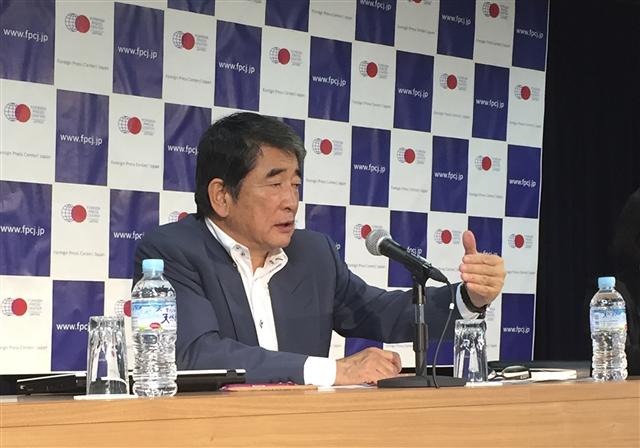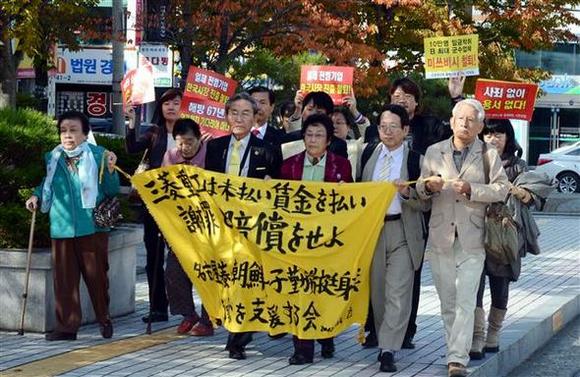 |
Yukio Okamoto, an outside director of Mitsubishi Materials, speaks at the Foreign Correspondents’ Club of Japan in Tokyo, saying that the company is planning to offer the same apology to prisoners of war from the UK, the Netherlands, and Australia, July 22. (AP/Yonhap News) |
Korean forced laborers were in a different legal situation, Japan argues, while effectively ignoring Korean claims
Japanese company Mitsubishi Materials has agreed to provide an apology and compensation to Chinese who were forced to work for the company during the Second World War. On July 19, the company also apologized to American prisoners of war who had been pressed into service, while announcing that it would also apologize to victims from various countries, including the United Kingdom. But the company is declining to apologize or offer compensation to Koreans who were forced to work there, claiming that their situation was different.On July 23, Mitsubishi Materials concluded negotiations with a group of Chinese victims of forced labor by agreeing to apologize and pay 2 million yen (US,150) per person to 3,765 Chinese who were conscripted during the war and forced to work in 12 mines operated by the company, according to a report by Japanese wire service Kyodo News.“”In addition to the apology and payment of compensation, Mitsubishi Materials also agreed to pay 100 million yen (US7,700) and 200 million yen (UStpf=board/list&board_code=11.62 million) for building a memorial for the Chinese victims of forced labor and for carrying out an investigation into conscripted individuals who went missing,” the wire service said.“The two sides agreed to meet in Beijing next month around the 70th anniversary of the end of World War II to sign the final reconciliation agreement.”The negotiations were initiated in Jan. 2014.This is the biggest settlement that a Japanese corporation has ever granted Chinese victims of forced labor.The China News Service and the China Daily reported that this is the first time that Mitsubishi Materials will make an apology and offer compensation since a Japanese court rejected a lawsuit filed by Chinese victims of forced labor and that this is also the largest agreement in terms of the number of plaintiffs.Before Mitsubishi Materials agreed on July 23 to apologize and pay compensation to Chinese who were forced to work for it during World War II, it appears to have been in contact with the administration of Japanese Prime Minister Shinzo Abe, which is currently working to improve the country’s relations with China.“When Japanese companies make this kind of decision, they are immediately attacked by the right wing. For this reason it appears that Mitsubishi Materials held preliminary consultations with the Liberal Democratic Party about this issue,” said Hideki Yano, secretary general of the National Network for Prosecuting Those Guilty of Compulsory Detention, a Japanese civic group, during a telephone interview with the Hankyoreh on July 24.“The Japanese government would like to avoid commenting about legal proceedings between Chinese individuals and Japanese companies. The government position continues to be that all claims regarding the war between Japan and China have been null and void since the proclamation of the joint statement between the two countries in 1972,” said Chief Cabinet Secretary Yoshihide Suga during the regular press briefing on July 24.While Mitsubishi Materials has recently announced its plans to apologize and provide compensation to Americans and Chinese who were conscripted into forced labor, it is refusing to do the same for Korean victims, arguing that they have a different legal status. The Japanese government adheres to the position that the compulsory mobilization of Koreans living under colonial rule was a legal action that was sanctioned by the National Mobilization Law, which took effect in 1938. |
Victims of colonial exploitation enter Gwangju District Court to submit their claim for compensation for unpaid wages. Their sign implores Mitsubishi to compensate them for their work in the 1940s. (Newsis) |

english.hani.co.kr/arti/english_edition/e_international/701785.html



